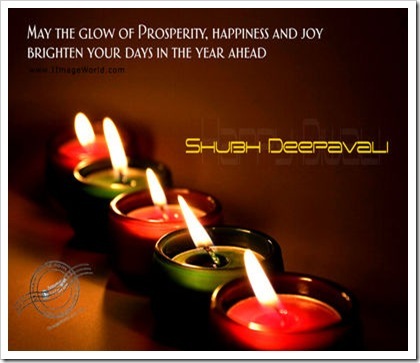节庆:Deepavali

Diwali
From Wikipedia, the free encyclopedia
Diwali
Deepavali, or Divali is a major Indian festival, and a significant festival inHinduism, Sikhism and Jainism. [3] Many legends are associated with Diwali. Today it is celebrated by Hindus, Jains and Sikhs across the globe as the "Festival of Lights," where the lights or lamps signify victory of good over the evil within every human being. The festival is also celebrated by Buddhists of Nepal, particularly the Newar Buddhists.
In many parts of India, it is the homecoming of King Rama of Ayodhya after a 14-year exile in the forest.[4] The people of Ayodhya (the capital of his kingdom) welcomed Rama by lighting rows (avali) of lamps (deepa), thus its name, Deepavali. This word, in due course, became Diwali in Hindi. But, in South Indian languages, the word did not undergo any change, and hence the festival is called Deepavali in southern India. Southern India marks it as the day Lord Krishna defeated the demon Narakasura.
Diwali is celebrated on the first day of the lunar Kartika month, which comes in the month of October or November.
In Jainism it marks the nirvana of Lord Mahavira, which occurred on October 15, 527 BCE. The Sikhs celebrate Diwali for a different reason; on this day, the Sixth Guru, Guru Hargobind Ji, was freed from imprisonment along with 52 Hindu Kings (political prisoners) whom he had arranged to be released as well. After his release he went to Darbar Sahib (golden temple) in the holy city of Amritsar. There, he was greeted by Sikhs and many other people. In happiness they lit candles and diyas to greet the Guru. In India, Diwali is now considered to be a national festival, and the aesthetic aspect of the festival is enjoyed by most Indians regardless of faith.[5]
A row of lamps, part of the Diwali observance.
Also called Translation: Row of Lights; Deepavali, Festival of Lights
Observed by Religiously by Hindus, Sikhs and Jains. Other Indians celebrate the cultural aspects.
Type Religious, Indian
Significance Celebrate victory over evil, and uplifting of spiritual darkness.
Date New moon day of Kartika, although the celebrations begin two days prior and end two days after that date
2007 date November 9
2008 date October 28 [1] [2]
2009 date October 17 It might change in the future
Celebrations Decorating homes with lights, Fireworks, distributing sweets and gifts.
Observances Prayers, Religious rituals (see puja, prashad)
Deepavali, or Divali is a major Indian festival, and a significant festival in Hinduism, Sikhism and Jainism. [3] Many legends are associated with Diwali. Today it is celebrated by Hindus, Jains and Sikhs across the globe as the "Festival of Lights," where the lights or lamps signify victory of good over the evil within every human being. The festival is also celebrated by Buddhists of Nepal, particularly the Newar Buddhists.
In many parts of India, it is the homecoming of King Rama of Ayodhya after a 14-year exile in the forest.[4] The people of Ayodhya (the capital of his kingdom) welcomed Rama by lighting rows (avali) of lamps (deepa), thus its name, Deepavali. This word, in due course, became Diwali in Hindi. But, in South Indian languages, the word did not undergo any change, and hence the festival is called Deepavali in southern India. Southern India marks it as the day Lord Krishna defeated the demon Narakasura.
Diwali is celebrated on the first day of the lunar Kartika month, which comes in the month of October or November.
In Jainism it marks the nirvana of Lord Mahavira, which occurred on October 15, 527 BCE. The Sikhs celebrate Diwali for a different reason; on this day, the Sixth Guru, Guru Hargobind Ji, was freed from imprisonment along with 52 Hindu Kings (political prisoners) whom he had arranged to be released as well. After his release he went to Darbar Sahib (golden temple) in the holy city of Amritsar. There, he was greeted by Sikhs and many other people. In happiness they lit candles and diyas to greet the Guru. In India, Diwali is now considered to be a national festival, and the aesthetic aspect of the festival is enjoyed by most Indians regardless of faith.[5]
屠妖節(Deeppavali),又稱為萬燈節、印度燈節,於每年10月21日舉行,是印度教「以光明驅走黑暗,以善良戰勝邪惡」的節日。[1]耆那教、錫克教和尼泊爾的佛教信徒都慶祝這個節日。
[编辑]背景
相傳世界被妖魔所侵擾,天神下凡降魔。降魔後,大地女神為天神誕下一名兒子-「Naraka Suran」。身為大地女神之子的他卻與邪惡為伍,並強迫百姓不准點燈。天神應百姓所求,與Naraka Suran展開正邪大戰。Naraka Suran死後,人民點燈慶祝。[2]














发表评论